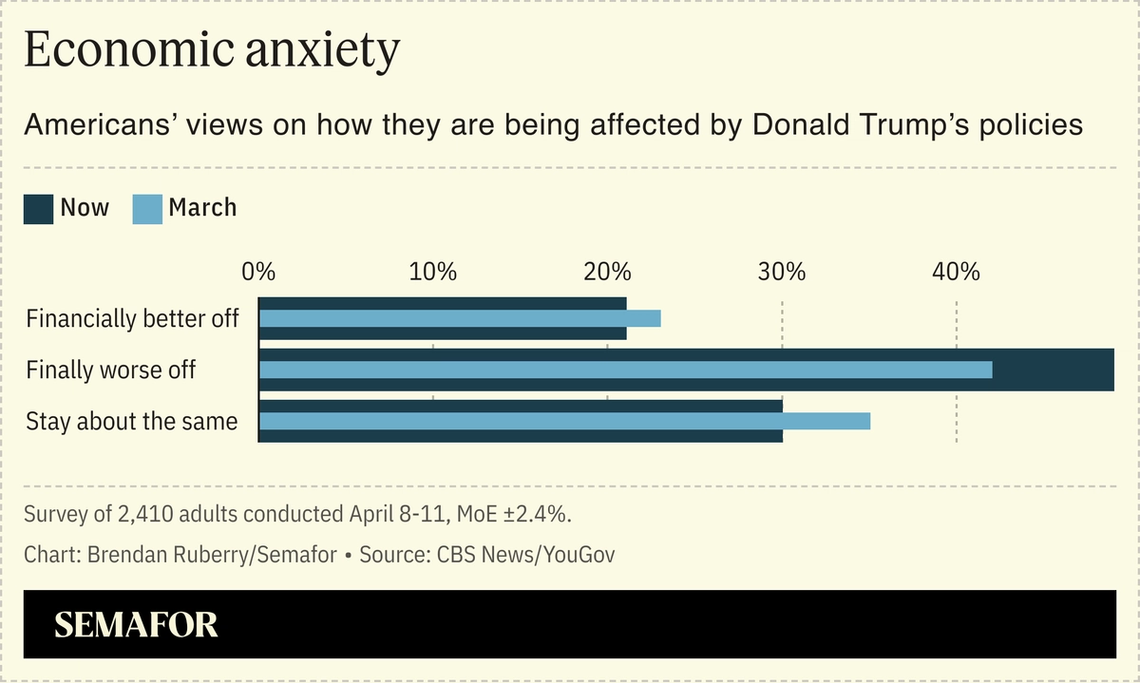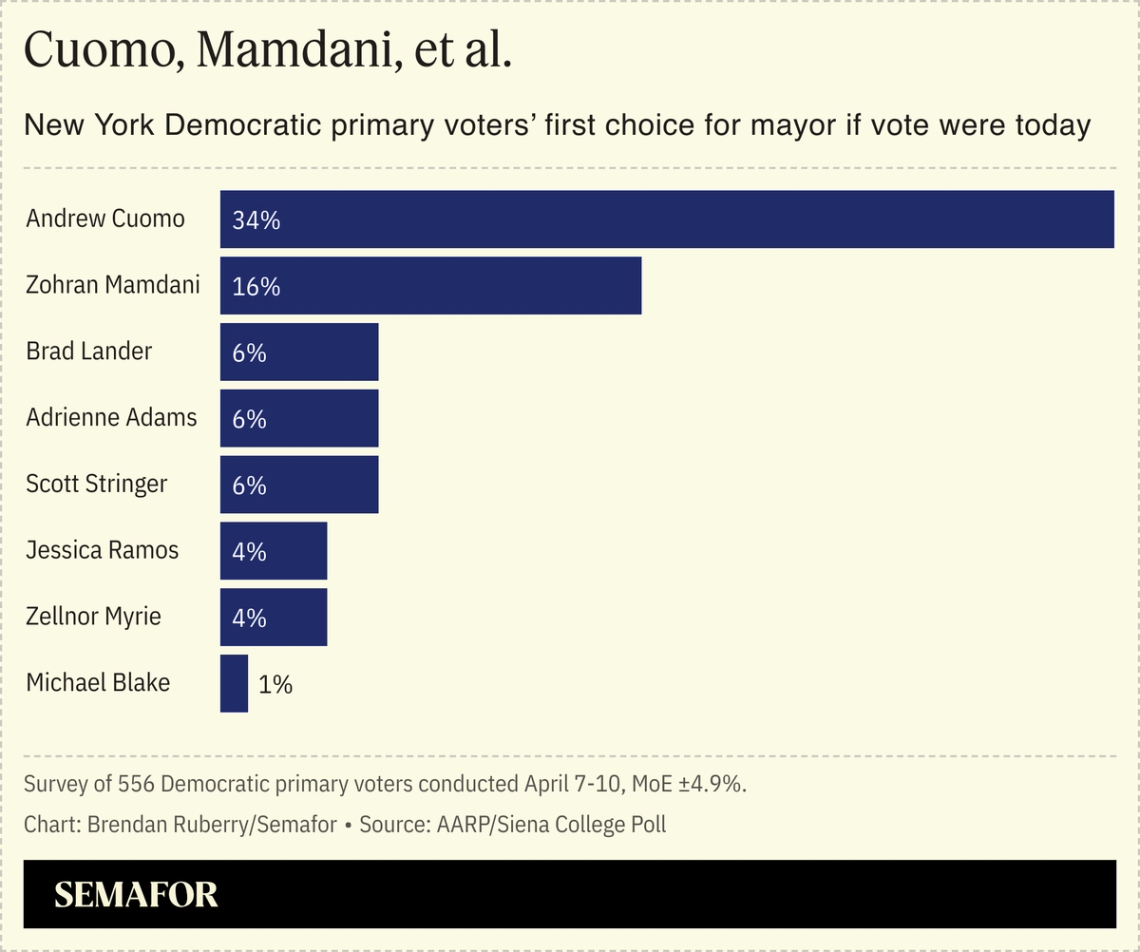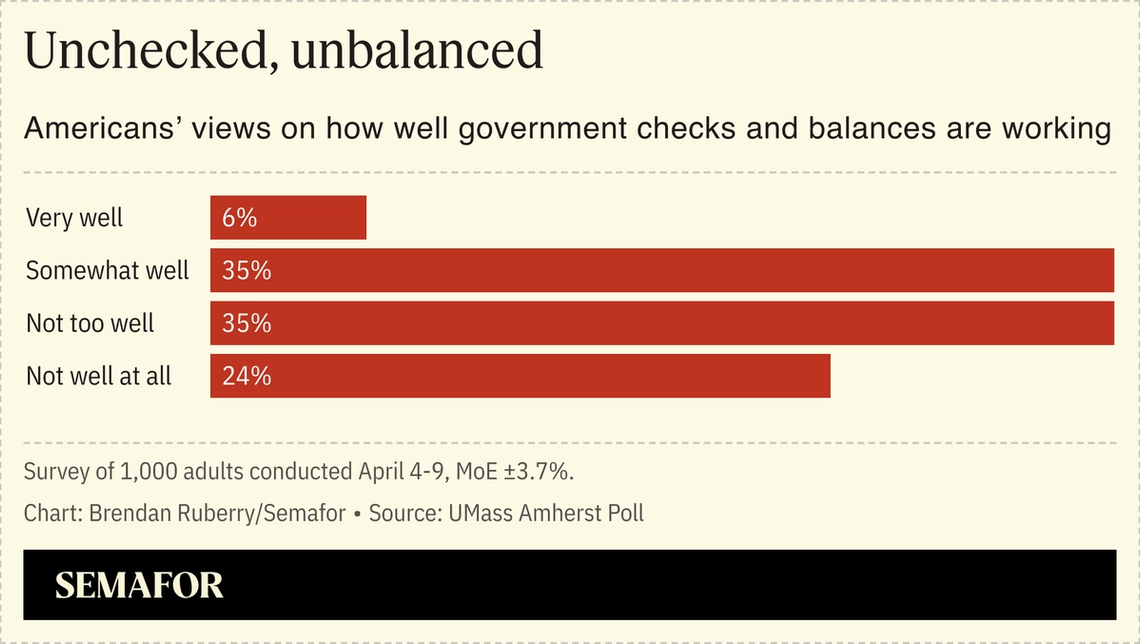 Polls The president watered down his Liberation Day tariffs, and the markets spiked up, at least briefly. But voter perceptions about his economic management, which were high throughout the 2024 election, haven’t recovered. Optimism about Trump’s policies now tracks with partisanship: Just 16% of them want Congress to wrestle back control of tariffs, and 62% of them now say that the United States can and should “make what it needs” without foreign trade. Republicans are also far more likely to say they, personally, are currently better off under Trump — 45% of them say this, compared to 18% of independents and 3% of Democrats. For most voters, until and unless there are obvious economic gains from this policy, the Trump approach is worrying.  There are three kinds of Democratic campaigns for mayor of New York City right now. One: The Andrew Cuomo campaign, which is trying to win. Two: The Zohran Mamdani campaign, which has established itself as the top Cuomo competitor, and is also trying to win. Three: Everybody else, trying to convince voters not to rank Cuomo at all so that an alternative candidate can win the ranked-choice count. Mamdani beats Cuomo 28-23 with voters under age 50; Cuomo beats him 42-7 with older voters and by similar margins with Black and Hispanic voters. And in the instant runoff, where votes for weaker candidates are reassigned until one candidate gets a majority, Cuomo gets more second-choice votes from supporters of Adrienne Adams and Brad Lander than Mamdani does. Both of those candidates argue that they can consolidate the anti-Cuomo vote more effectively. Neither has been able to match Mamdani’s fundraising, or break through to voters like he has.  The Trump administration’s PR mission this week was convincing most Americans that the deportation of Kilmar Ábrego García was legal and that the Supreme Court actually approved it. It hasn’t quite worked. Fifty-eight percent of adults polled here say that a president defying the Supreme Court should be impeached and removed from office, an idea that even most Democrats have been reluctant to bring up. And most adults believe that checks and balances have broken down, including a third of Republicans. The GOP’s bet is that these are largely academic questions, that the policies at issue will be popular, and that Democrats who say Trump should obey the court will lose if voters see the real issue as deporting non-citizens accused of crimes. Ads Mayor Ras J. Baraka/Facebook Mayor Ras J. Baraka/Facebook- Ras Baraka for Governor, “Stand Up to ICE.” Newark’s mayor has clashed with the Trump administration on immigration enforcement since week one, accusing other Democrats of ducking the fight. There’s footage here of Baraka, and no other candidate, protesting outside a would-be ICE facility. “Only one candidate has the courage to stand up to Trump,” says this spot, playing back his words: “We’re saying, you’re not gonna open up!” No other Democrat in the field has centered their anti-Trump work like this, and when they’ve criticized the administration in their own messaging, it’s only been about the economy.
- Mikie Sherrill for Governor, “Fighter.” Sherrill, who’s been beating Baraka for local Democratic endorsements in much of the state, has a more generalized anti-Trump message, more rooted in her Navy pilot biography. The word “fight” or “fighter” shows up three times here, with the candidate herself saying she was trained to take on threats, and ordinary people who support her saying she’ll “fight the Trump-Musk madness that’s wrecking our economy” and “even threatening Social Security.”
- Corey O’Connor for Mayor, “Oh! O’Connor.” Pittsburgh’s Democratic primary election between Mayor Ed Gainey and Controller Corey O’Connor is largely about crime and competence, and Gainey’s attempted to portray his challenger as a pawn of “MAGA megadonors.” O’Connor’s response: An anti-MAGA ad that talks about his progressive wins in the city and sells him as “the progressive mayor who gets the job done.” (The gimmick of ordinary people over-stating the “O” in his name resembles what you see in ads for candidates with far less familiar names, another trust-this-guy tactic.)
Scooped!There are many more stories to write about the congressional gerontocracy; no one wants a repeat of the Kay Granger story, where an elderly Texas congresswoman went into a memory care facility without anyone noticing. Ike Allen’s profile of Eleanor Holmes Norton, DC’s sole delegate and the oldest member of the House, is a careful look at a local icon who has clearly been fading, a subject Washingtonians don’t want to talk about. It’s fair about the work she’s gotten done, and meticulous in describing how, at 87, her bandwidth for debate and political combat has shrunk. Next - 53 days until primaries in New Jersey
- 60 days until primaries in Virginia
- 67 days until primaries in New York City
- 200 days until off-year elections
- 563 days until the 2026 midterm elections
David RecommendsDid the 118th Congress need its own history book? Before reading “Mad House,” I’d have said no. Reporters who covered Kevin McCarthy’s excruciating House Speaker race, then the even more painful election to replace him, do not want to relive it. But Annie Karni and Luke Broadwater beautifully reconstruct McCarthy’s short time with the gavel, obtained by a “Ponzi scheme of promises,” and find both meaning and comedy. The meaning: McCarthy presided over the House GOP’s transformation into an auxiliary for whatever Donald Trump wanted. The comedy: Too much of it to get into here. One excruciating section covers McCarthy’s attempts to make fast money after the speakership, like showing up to book publishers with no idea what he would write, asking the “experts” to “tell me.” |